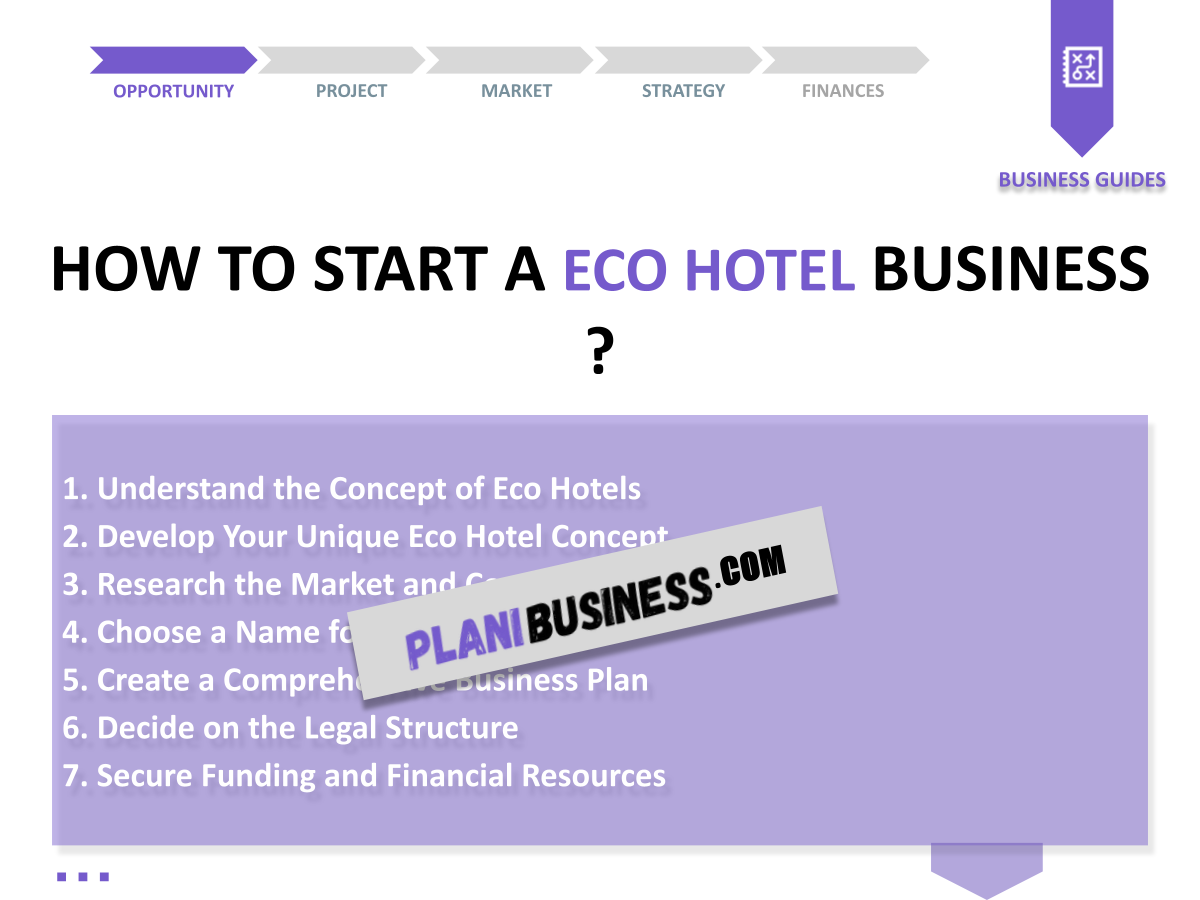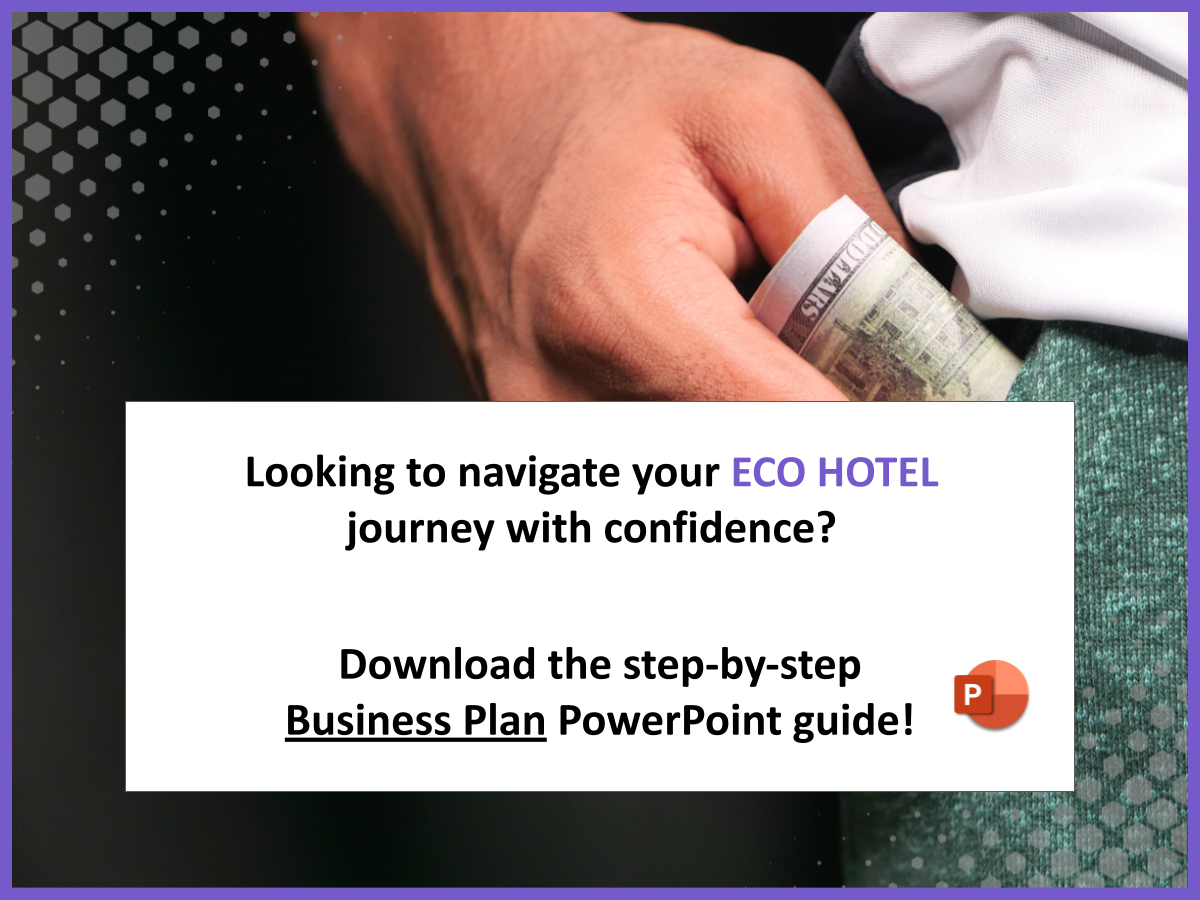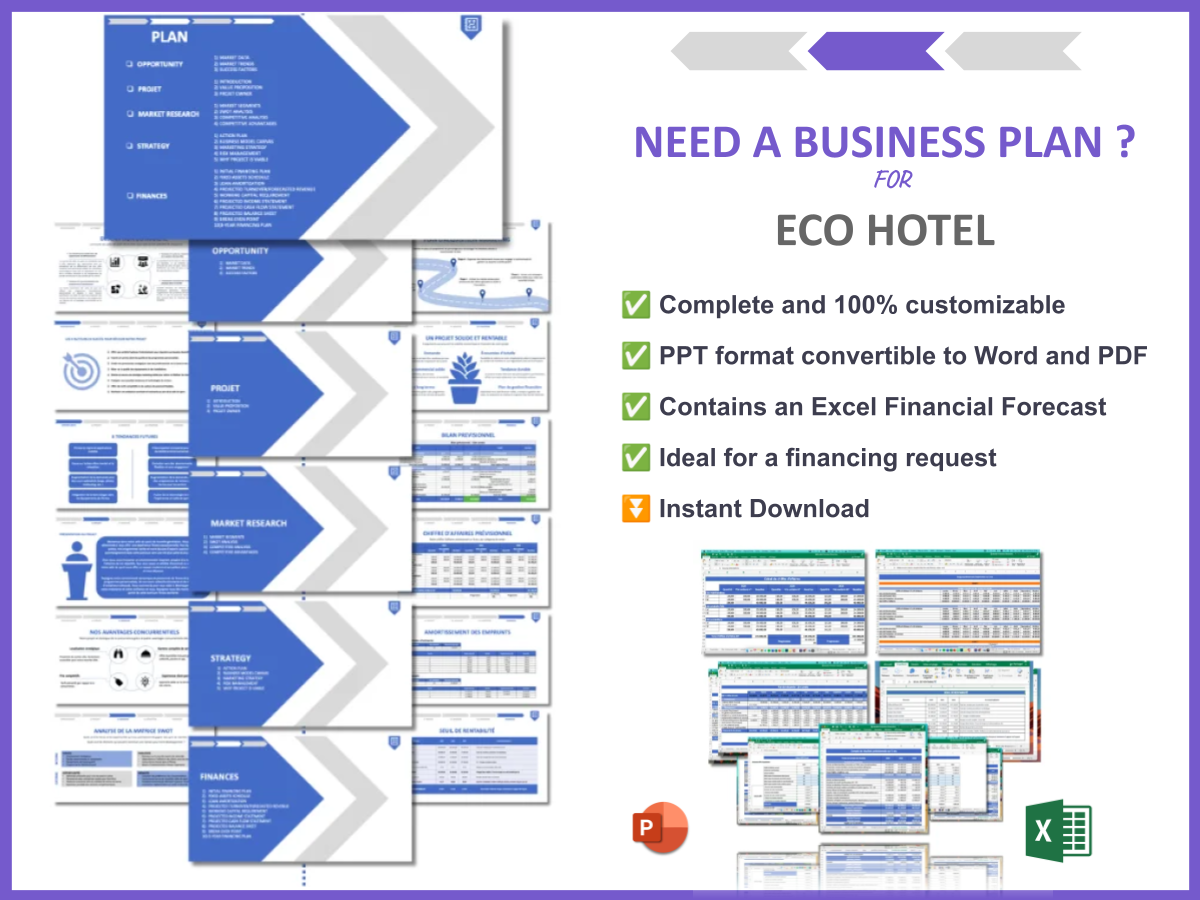Are you curious about how to start an eco hotel? You’re not alone! With the rise in eco-conscious travel, more and more entrepreneurs are exploring the idea of establishing sustainable accommodations that not only provide comfort but also promote environmental responsibility. Did you know that eco-tourism is projected to grow by over 25% in the next few years? This trend presents a golden opportunity for those looking to make a positive impact while running a profitable business. In this article, we’ll guide you through the essential steps to successfully launch your eco hotel.
- Understanding the concept of eco hotels
- Developing a unique eco hotel concept
- Researching the market and competitors
- Choosing a name for your eco hotel
- Creating a comprehensive business plan
- Deciding on the legal structure
- Securing funding and financial resources
- Registering your eco hotel
- Obtaining necessary permits and licenses
- Setting up financial management systems
- Establishing your brand identity
- Marketing and advertising your eco hotel
- Assembling your team
1. Understand the Concept of Eco Hotels
When considering how to start an eco hotel, it’s crucial to first grasp what an eco hotel truly is. Essentially, it’s an accommodation that prioritizes sustainability and minimizes its environmental impact. Think of it as a sanctuary for eco-conscious travelers who seek comfort without harming the planet.
Eco hotels often utilize renewable energy, focus on local sourcing, and implement waste reduction strategies. They create a unique experience for guests while promoting responsible tourism. It’s not just about a bed to sleep in; it’s about an experience that aligns with the values of today’s environmentally aware consumers.
Here are some key features that define eco hotels:
- Renewable Energy: Utilizing solar panels, wind turbines, or geothermal systems.
- Local Sourcing: Supporting local farmers and artisans by using their products.
- Waste Reduction: Implementing recycling programs and minimizing single-use plastics.
2. Develop Your Unique Eco Hotel Concept
To kick things off, you need to nail down your unique eco hotel concept. What makes your vision stand out? Will it focus on luxury, rustic charm, or a blend of both? Consider your target audience and their preferences.
- Luxury Eco Hotel: High-end accommodations with spa services and gourmet organic meals.
- Back-to-Nature Experiences: Rustic cabins in the woods, offering hiking and nature tours.
- Family-Friendly Eco Stays: Eco-friendly amenities with activities for children.
Once you have a clear vision, it’s time to refine it. Consider the types of sustainable practices you want to incorporate, like solar energy or local organic meals. Don’t forget to think about the unique experiences you can offer to guests that align with your eco-friendly mission.
3. Research the Market and Competitors
Next up, you need to dive into some serious market research. Understanding the landscape is key to how to start an eco hotel. This involves analyzing competitors and identifying gaps in the market that your hotel could fill. A well-informed approach can significantly increase your chances of success.
Begin by identifying existing eco hotels in your target area. Take note of their strengths and weaknesses. This will help you craft a unique value proposition that appeals to eco-conscious travelers. Here’s a quick overview of what to look for:
| Competitor | Strengths | Weaknesses |
|---|---|---|
| Eco Lodge A | Strong local partnerships | Limited amenities |
| Green Retreat B | Excellent online presence | High prices |
| Nature Stay C | Unique nature experiences | Remote location |
By analyzing this data, you can pinpoint what makes your future eco hotel unique and how it can stand out in a competitive market. Remember, understanding your competition is just as vital as knowing your target audience.
4. Choose a Name for Your Eco Hotel
Your hotel’s name is your first impression, so make it count! It should reflect your eco-friendly ethos and resonate with your target audience. A catchy and memorable name can significantly enhance your marketing efforts.
Here are some tips for choosing the perfect name:
- Reflect Your Mission: Incorporate words that signify sustainability, nature, or eco-friendliness.
- Keep It Simple: Choose a name that is easy to spell and pronounce.
- Check Availability: Ensure that the domain name and social media handles are available.
Brainstorm a list of names and ask for feedback from potential guests or industry professionals. You might even consider running a poll on social media to gauge interest in different options. Remember, your name is not just a label; it’s a crucial part of your brand identity!
5. Create a Comprehensive Business Plan
Now comes the fun part—creating a detailed business plan. This is where you outline your vision, mission, and operational strategies for your eco hotel. A solid plan will help you secure funding and navigate the complexities of running an eco hotel.
A comprehensive business plan typically includes:
- Executive Summary: A brief overview of your hotel concept and objectives.
- Market Analysis: Insights into your target market and competitors.
- Marketing Strategy: How you plan to attract guests.
- Financial Projections: Estimated revenue, expenses, and profitability.
I recommend checking out this business plan template for Eco Hotel. It’s super detailed and can save you a ton of time! Having a solid business plan is not just a requirement for securing financing; it also serves as a roadmap for your eco hotel’s future.
As you draft your business plan, consider including the following sections:
- Company Description: Details about your eco hotel, including location and services.
- Marketing and Sales Strategies: Outline how you will attract and retain customers.
- Operational Plan: Describe day-to-day operations and management structure.
- Financial Plan: Include startup costs, funding requirements, and projected profits.
6. Decide on the Legal Structure
Choosing the right legal structure is crucial for your eco hotel. You’ll need to decide whether to operate as a sole proprietorship, partnership, or corporation. Each has its pros and cons, particularly concerning liability and taxes.
Here’s a quick breakdown of common legal structures:
| Legal Structure | Pros | Cons |
|---|---|---|
| Sole Proprietorship | Easy to set up; complete control | Unlimited personal liability |
| Partnership | Shared responsibility; more resources | Shared profits; potential conflicts |
| Corporation | Limited liability; easier to raise funds | Complex regulations; double taxation |
Consult with a legal expert to ensure you’re making the best choice for your situation. The right legal structure can protect your personal assets and help you navigate tax obligations effectively. This decision is foundational for your eco hotel’s success and longevity.
7. Secure Funding and Financial Resources
Funding is a significant hurdle for many aspiring hoteliers. To successfully navigate how to start an eco hotel, explore various options for securing the financial resources you need. This may involve traditional bank loans, grants specifically for sustainable businesses, or even crowdfunding.
Here are some common funding sources to consider:
- Bank Loans: Traditional loans can provide the capital needed to cover startup costs.
- Investors: Seek out investors who are passionate about eco-friendly initiatives.
- Grants: Research grants available for sustainable tourism and eco-friendly projects.
- Crowdfunding: Platforms like Kickstarter or Indiegogo can help raise initial funds by pre-selling experiences or stays.
Prepare to showcase your business plan when approaching potential investors or lenders. Highlight your unique value proposition and how your eco hotel will meet the growing demand for sustainable travel. It’s also a good idea to have a clear financial plan outlining your expected costs and revenue projections.
Don’t forget to consider sustainable financing options that align with your eco-friendly vision. Some banks and organizations offer favorable terms for businesses focused on sustainability.
8. Register Your Eco Hotel
Once you have your funding in place, it’s time to make it official! Registering your eco hotel with the appropriate government authorities is a crucial step in how to start an eco hotel. This process can vary by location, so it’s essential to understand the specific requirements in your area.
Here’s a quick checklist to guide you through the registration process:
- Choose a Business Name: Ensure it reflects your eco-friendly mission and is not already in use.
- File for Registration: Submit the necessary forms to your local or state government.
- Get an Employer Identification Number (EIN): This is necessary for tax purposes.
- Set Up a Business Bank Account: Keep your business finances separate from personal ones.
Additionally, check if you need any specific permits or licenses to operate an eco hotel. This may include health and safety inspections, zoning permits, and environmental compliance certifications. Ensuring that all your paperwork is in order before opening your doors will save you time and stress later on!
9. Obtain Necessary Permits and Licenses
In addition to registration, you’ll need various permits and licenses to operate legally. This is a crucial step in how to start an eco hotel, as it ensures that your business complies with local regulations and standards. The types of permits required can vary significantly based on your location and the specific services you plan to offer.
Here are some common permits and licenses you might need:
- Health and Safety Permits: Ensure that your property meets health and safety standards.
- Business License: A general license to operate your business in your city or county.
- Zoning Permits: Verify that your property is zoned for hospitality use.
- Environmental Compliance: Certifications that demonstrate your commitment to sustainability.
To make this process easier, consider creating a checklist of all required permits and licenses. Here’s a simple table to help you track your progress:
| Permit/License | Requirements | Status |
|---|---|---|
| Health and Safety Permit | Inspection and approval from local health department | Pending |
| Business License | Application form and fee | Completed |
| Zoning Permit | Approval from local zoning board | In Process |
Completing these requirements will help you avoid fines and legal issues down the line. Be proactive in ensuring all your paperwork is in order before opening your doors!
10. Set Up Financial Management Systems
Effective financial management is crucial for any business, especially for an eco hotel where sustainability is key. Implementing robust systems for budgeting, accounting, and tracking expenses is essential for long-term success. This is an important step in how to start an eco hotel that cannot be overlooked.
Here are some key components to consider when setting up your financial management systems:
- Budgeting: Create a detailed budget that outlines your expected income and expenses.
- Accounting Software: Consider using software designed specifically for the hospitality industry.
- Regular Financial Reviews: Schedule monthly reviews to monitor your financial health and make adjustments as needed.
Here’s a comparison of popular accounting software options for eco hotels:
| Software | Features | Cost |
|---|---|---|
| Hotelogix | Cloud-based, multi-property management | Starting at $3/month |
| QuickBooks | Comprehensive accounting tools | Starting at $25/month |
| FreshBooks | User-friendly, invoicing features | Starting at $15/month |
Choosing the right financial management tools will help streamline your operations and keep your eco hotel on track for success. Don’t underestimate the importance of solid financial practices in achieving your sustainability goals.
11. Establish Your Brand Identity
Your brand is how guests will perceive your eco hotel. Developing a compelling brand identity that reflects your values and resonates with your target audience is essential. This includes your logo, color scheme, and overall aesthetic. Remember, a strong brand can set you apart in the competitive hospitality market.
Here are some key elements to consider when establishing your brand identity:
- Logo Design: Create a logo that visually represents your eco-friendly mission.
- Color Palette: Choose colors that evoke nature, such as greens and earth tones.
- Tagline: Develop a catchy tagline that encapsulates your eco-friendly philosophy.
Once you have these elements in place, ensure they are consistently applied across all your marketing materials. Here’s a quick checklist for brand consistency:
- Website: Ensure your branding is reflected on your website.
- Social Media: Use consistent visuals and messaging across all platforms.
- Printed Materials: Include your branding on brochures, business cards, and signage.
Establishing a strong brand identity will help attract guests who share your commitment to sustainability and create a loyal customer base.
12. Market and Advertise Your Eco Hotel
Marketing is essential to attract guests to your eco hotel. Utilize various channels to spread the word about your unique offerings. Emphasizing your eco-friendly initiatives in your marketing materials will appeal to environmentally conscious travelers.
Here are some effective marketing strategies:
- Social Media Marketing: Use platforms like Instagram and Facebook to showcase your hotel’s features and eco-friendly practices.
- Content Marketing: Create blog posts about sustainable travel tips or local attractions to drive traffic to your website.
- Partnerships: Collaborate with local businesses and eco-tourism organizations to reach a broader audience.
Consider offering promotions for early bookings or eco-friendly packages to entice guests. Here’s a quick overview of potential promotional strategies:
| Promotion Type | Description | Target Audience |
|---|---|---|
| Early Bird Discount | Discount for bookings made well in advance | Budget-conscious travelers |
| Eco Package | Special rate for guests who participate in sustainability initiatives | Eco-conscious travelers |
| Referral Program | Discounts for guests who refer friends | Repeat guests |
By effectively marketing your eco hotel, you can create awareness and drive bookings, all while promoting sustainable tourism.
13. Assemble Your Team
Your team is the backbone of your eco hotel. Hiring individuals who share your passion for sustainability and hospitality is crucial for success. A motivated team can significantly enhance the guest experience and contribute to your hotel’s reputation.
Here are some tips for assembling your team:
- Hire for Passion: Look for candidates who are genuinely interested in eco-friendly practices.
- Provide Training: Offer training on sustainable practices and customer service to ensure consistency.
- Foster Team Culture: Create a positive work environment that encourages collaboration and innovation.
Consider creating a mission statement that outlines your hotel’s values and commitment to sustainability. This can serve as a guiding principle for your team. Here’s a simple framework for a mission statement:
"Our mission is to provide exceptional hospitality while minimizing our environmental impact and promoting sustainable practices."
Fostering a strong team culture will contribute to your hotel’s success and create a memorable experience for your guests. With a dedicated and passionate team, you’ll be well on your way to making your eco hotel a thriving success!
Conclusion
Starting an eco hotel can be a rewarding venture that contributes positively to the environment while providing unique experiences for travelers. By following the steps outlined in this guide, you can successfully navigate the complexities of establishing your eco-friendly accommodation. Remember, the key to success lies in understanding your market, developing a strong brand, and building a passionate team dedicated to sustainability.
To deepen your knowledge and enhance your planning process, consider checking out our articles on how to create a SWOT Analysis for Eco Hotel and how to launch an Eco Hotel Marketing Plan? With Example. These resources will provide valuable insights to help you thrive in the competitive eco-tourism market. Now that you have a roadmap, it’s time to take action and turn your eco hotel dreams into reality!
FAQ
1. What is an eco hotel?
An eco hotel is an accommodation that prioritizes sustainability and minimizes its environmental impact. These hotels often utilize renewable energy, focus on local sourcing, and implement waste reduction strategies to promote eco-friendly tourism.
2. How can I make my hotel more eco-friendly?
To make your hotel more eco-friendly, consider implementing practices such as using renewable energy sources, reducing water usage, sourcing local and organic products, and minimizing waste through recycling and composting programs.
3. What are the benefits of eco tourism?
Eco tourism provides numerous benefits, including promoting environmental awareness, supporting local economies, and encouraging conservation efforts. It also attracts a growing demographic of eco-conscious travelers looking for sustainable options.
4. How do I market my eco hotel?
Marketing your eco hotel involves showcasing your sustainable practices through various channels such as social media, content marketing, and partnerships with local businesses. Highlighting your eco-friendly initiatives will attract environmentally conscious guests.
5. What licenses do I need to start an eco hotel?
The licenses required to start an eco hotel can vary by location but typically include health and safety permits, a business license, zoning permits, and environmental compliance certifications. It’s essential to check local regulations.
6. How much does it cost to start an eco hotel?
The costs to start an eco hotel can vary widely based on location, size, and amenities. Factors such as property acquisition, renovations, and initial operating costs should be considered. Conducting a detailed financial analysis is crucial.
7. What eco certifications are available for hotels?
Various eco certifications are available for hotels, including LEED (Leadership in Energy and Environmental Design), Green Key, and EarthCheck. These certifications can help demonstrate your commitment to sustainability and attract eco-conscious travelers.
8. How can I engage the local community?
Engaging the local community can be achieved by sourcing products from local vendors, collaborating with local artisans, and offering community-based experiences for your guests. This fosters goodwill and supports the local economy.
9. What sustainable practices can I implement in my hotel?
Sustainable practices for your hotel may include using energy-efficient appliances, implementing water conservation measures, providing recycling options, and offering organic or locally-sourced food in your restaurant.
10. How do I create a business plan for my eco hotel?
To create a business plan for your eco hotel, outline your vision, market analysis, marketing strategy, operational plan, and financial projections. A well-structured business plan will serve as a roadmap for your hotel’s success.







